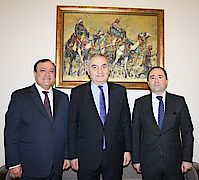TRACECA and UN OHRLLS: integration and cooperation development as a guarantee of success in the Region
On 3rd October 2017 upon the official invitation of Ms. Fekitamoeloa Katoa Utoikamanu, Under Secretary General and High Representative for the Least Developed Countries, Landlocked Developing Countries and Small Island Developing States (UN OHRLLS), Mr. Ciopraga made a visit to UN OHRLLS Secretariat.
Within the bilateral meeting, Mr. Ciopraga and Ms. Utoikamanu exchanged of opinions on the possible fields of cooperation between TRACECA and UN OHRLLS.
Mr. Ciopraga mentioned that for 24 years the TRACECA institutions have been carrying out continuous activity on the development of transport communication in the corridor and emphasized a considerable contribution of the TRACECA member states to the development of international cooperation in the field of transport. So far 13 states have signed and ratified the Basic Multilateral Agreement TRACECA, including 7 land locked countries of the Europe-the Caucasus-Asia region.
In view of the fact that TRACECA is internationally acknowledged as Programme of the European Union, as of today within TRACECA the European Commission has financed 85 projects to the total amount surpassing 187 million euros. These projects favoured the attraction of large investments out of international financial institutions and more than 40% of the budget was allocated for the support and development of the transport infrastructure along the corridor.
Based on the Strategy for development of the international transport corridor Europe-the Caucasus-Asia for the period 2016-2026, the improvement of transport infrastructure within the TRACECA corridor goes on in parallel with taking measures to ensure free movement of goods and passengers. The member-states initiate efforts in order to provide competitive services for long-distance traffic along the TRACECA corridor in view of trade development between Central Asia, including western and central regions of China, and the West (Europe and Turkey, including the routes to the Middle East and the Mediterranean region).
In its turn, Ms. Utoikamanu emphasized that at the moment infrastructure is a priority for UN OHRLLS countries. As it is stated in Vienna Programme of Action for the decade 2014-2024, partnerships between landlocked developing countries and transit countries is mutually beneficial for the improvement and constant maintenance of the infrastructure connectivity and of technical and administrative arrangements in their transport, customs and logistic systems.
It is also mentioned that efficient transit transport systems, strong collaborative efforts in multimodal transport infrastructure development and interlinkage, the promotion of an enabling legal environment and institutional arrangements between landlocked developing and transit countries are also crucial for achieving structural transformation and sustainable economic growth.
In this regard, regional and subregional collaboration and integration must be promoted on the basis of the mutual interests of both landlocked and transit countries.
Within the exchange of opinions, Mr. Ciopraga shared with Ms. Utoikamanu about EU-China Connectivity Platform, which plays important role for the member-countries in the regions that connect Europe and Asia covering the Caucasus, further effectiveness of the implementation of the TRACECA Programme.
In continuation of discussion, Ms. Utoikamanu and Mr. Ciopraga expressed readiness to strengthen mutual dialogue and built up cooperation based on conclusion of the Memorandum of Understanding between TRACECA and UN OHRLLS.
Country:
Mode:
Published:
Permanent Secretaritat of the IGC TRACECA






